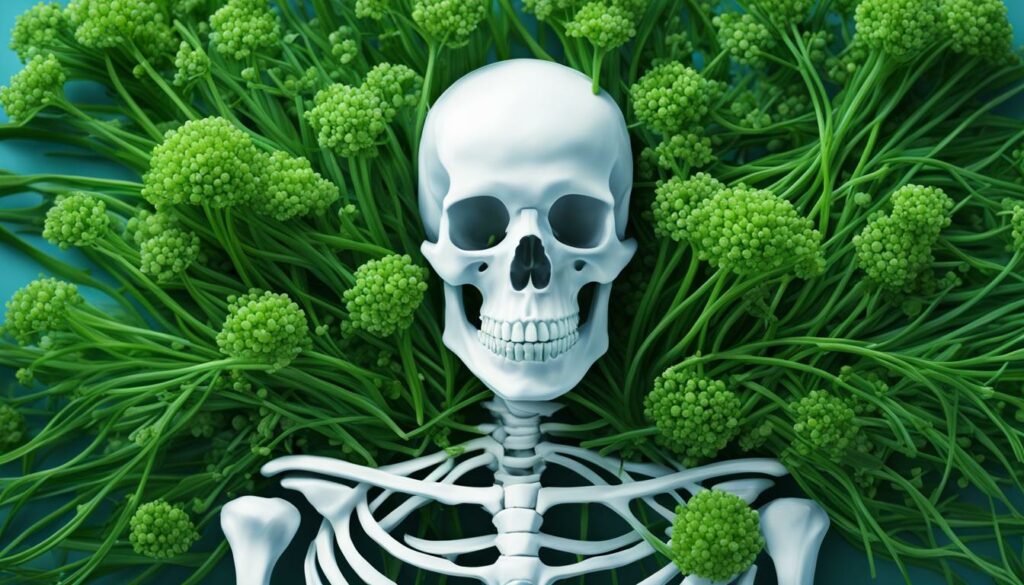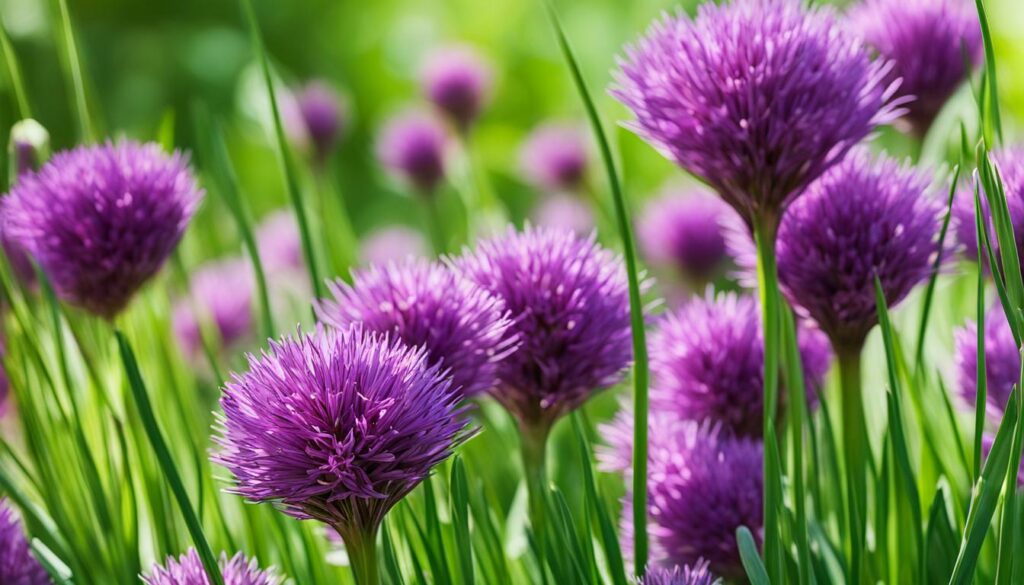Chives, a member of the allium family, are more than just a flavorful herb to garnish your dishes. These vibrant green stalks pack a nutritional punch and offer numerous health benefits.
From boosting your immune system to supporting bone health, chives are a versatile ingredient that can enhance both the flavor and wellness of your meals.
Chives are loaded with essential vitamins and minerals that are vital for overall health. They contain vitamins A and C, which are known for their immune-boosting properties. Additionally, chives are rich in minerals like potassium, calcium, and iron, which play a crucial role in maintaining proper bodily functions.
One of the standout health benefits of chives is their high antioxidant content. Antioxidants help protect the body against free radicals, which can cause oxidative stress and contribute to various chronic diseases. By including chives in your diet, you can give your body a natural defense against harmful oxidative damage.
Key Takeaways:
- Chives are packed with essential vitamins, minerals, and antioxidants.
- Vitamins A and C in chives promote a healthy immune system.
- Chives are a rich source of minerals like potassium, calcium, and iron.
- Chives have high antioxidant content that protects against oxidative stress.
- Incorporating chives into your meals can provide a flavorful boost to your overall wellness.
Prevent Cancer with Chives
Chives, along with other allium vegetables, offer potential cancer prevention benefits due to the presence of sulfur compounds. Studies suggest that these compounds can deter the growth and spread of cancerous cells in the body. Incorporating chives into your diet may be a flavorful way to take advantage of their potential cancer-fighting properties.
The Role of Allium Vegetables and Sulfur Compounds
Allium vegetables, such as chives, onions, and garlic, contain sulfur compounds that have been studied for their potential anti-cancer effects. These compounds, including allyl sulfides and sulforaphane, have shown promising results in inhibiting the growth and proliferation of cancer cells.
Incorporating chives into your diet may be a flavorful way to take advantage of their potential cancer-fighting properties.
While more research is needed to fully understand the mechanisms behind this protective effect, studies have shown positive associations between allium vegetable consumption and a decreased risk of certain cancers, including gastric, colorectal, and prostate cancer.
A Healthy Addition to Your Diet
Chives are a versatile ingredient that can be easily incorporated into various recipes. Whether added to salads, soups, or stir-fries, they lend a mild onion-like flavor that enhances the taste of dishes.
By including chives in your meals, you can not only add a burst of flavor but also potentially benefit from their cancer-preventive properties.
- Quick and easy to use as a garnish or ingredient
- Mild onion-like taste that complements a variety of dishes
- Potential cancer-fighting properties
It’s important to note that while chives and allium vegetables are generally safe to consume, they should not be used as a substitute for medical advice or treatment. If you have any concerns about your health or specific dietary needs, it’s best to consult with a healthcare professional.
Next, we will explore another health benefit of chives – their potential to boost bone health and prevent osteoporosis.
Boost Bone Health with Chives
Chives are not only flavorful additions to your culinary creations, but they also provide essential nutrients that can boost bone health.
One key nutrient found in chives is Vitamin K, which plays a critical role in maintaining bone density and preventing conditions like osteoporosis. Incorporating chives into your diet can be a natural and delicious way to support your skeletal system.
Vitamin K is known to enhance the absorption of calcium in the body, a vital mineral for maintaining strong and healthy bones. By ensuring optimal calcium utilization, Vitamin K helps prevent bone loss and promotes bone strength. Studies have shown that individuals who consume higher amounts of Vitamin K have a lower risk of developing fractures and osteoporosis, making it an essential nutrient for bone health.
Vitamin K and Bone Health
Vitamin K is involved in the production of key proteins that regulate bone metabolism and promote bone formation. One of these proteins, osteocalcin, helps incorporate calcium into the bone matrix, making bones stronger and more resistant to fractures.
Without adequate Vitamin K, osteocalcin production can be compromised, leading to decreased bone density and an increased risk of fractures.
Additionally, Vitamin K reduces the production of osteoclasts, cells that break down bone tissue. By inhibiting osteoclast activity, Vitamin K helps maintain a balance between bone formation and resorption, preventing the loss of bone mass that can occur with aging.
While Vitamin K supplements are currently being studied for their effectiveness in treating osteoporosis, incorporating Vitamin K-rich foods like chives into your diet is a natural way to support bone health.
By enjoying dishes that include chives regularly, you can ensure you’re getting a daily dose of this essential nutrient to promote strong and healthy bones.
| Nutrient | Amount per 100g |
|---|---|
| Vitamin K | 212.7 μg |
| Vitamin A | 435 IU |
| Vitamin C | 58.1 mg |
| Calcium | 92 mg |
| Potassium | 296 mg |
Table: Nutritional content of chives per 100g
In addition to Vitamin K, chives also contain other essential nutrients like Vitamin A, Vitamin C, calcium, and potassium. These nutrients contribute to overall bone health and support proper bone formation and maintenance. Including chives in your diet can provide a range of nutritional benefits that go beyond bone health.
Remember to enjoy chives in moderation and as part of a balanced diet. While chives offer numerous health benefits, consuming excessive amounts can cause stomach pain and indigestion.
By incorporating chives into your meals and dishes, you can savor their unique flavor while reaping the benefits they offer for your bones.

Improve Memory with Chives
Chives, with their unique flavor and vibrant green color, offer more than just culinary delight. They also contain nutrients that can support memory and cognitive function. Choline and folate, found in chives, have individually been linked to improved memory function and cognitive performance in adults.
Studies have shown that adults who consume foods rich in choline, such as chives, perform better on cognitive tests. Choline plays a vital role in the production of acetylcholine, a neurotransmitter that is involved in memory and learning. Low levels of choline have also been associated with a higher risk of developing Alzheimer’s disease, a degenerative disorder that affects memory and cognitive abilities.
Furthermore, folate, another key nutrient found in chives, has been shown to support cognitive function. Folate is involved in the synthesis of DNA and RNA and plays a crucial role in brain development and function. Adequate folate intake has been associated with better cognitive performance and a lower risk of cognitive decline.
Chives are a flavorful way to incorporate choline and folate into your diet, potentially enhancing memory and protecting against cognitive disorders.
Chives and Choline
Choline is an essential nutrient that is involved in various biological processes in the body. In addition to its role in memory and cognitive function, choline is also important for liver function, cell structure, and nerve signaling.
Here is a table highlighting the choline content in 100 grams of chives:
| Nutrient | Amount |
|---|---|
| Choline | 10.8 mg |
Folate for Brain Health
Folate, also known as Vitamin B9, is crucial for brain health and development. It plays a role in the synthesis of neurotransmitters and the maintenance of brain function. Here is a table showcasing the folate content in 100 grams of chives:
| Nutrient | Amount |
|---|---|
| Folate | 105 mcg |
By incorporating chives into your diet, you can enjoy these memory-boosting benefits while adding a delicious touch to your meals.
Nutritional Value of Chives
Chives, besides being a flavorful addition to various dishes, also offer significant nutritional benefits. These slim, vibrant green stalks are packed with essential vitamins, minerals, and antioxidants that can contribute to overall health and well-being. Let’s explore the nutritional value that chives bring to the table.
Vitamins in Chives
Chives are a rich source of several important vitamins that are vital for maintaining a healthy body. A single tablespoon of chives contains:
| Vitamin A | Vitamin C |
|---|---|
| 295 IU (6% DV) | 7.7 mg (13% DV) |
Vitamin A is essential for good vision, skin health, and a strong immune system. Meanwhile, vitamin C acts as a powerful antioxidant, aids in collagen production, supports immune function, and contributes to overall skin health.
Minerals in Chives
In addition to vitamins, chives contain an array of essential minerals that play crucial roles in various bodily functions. Here are some minerals found in chives:
| Mineral | Amount per tablespoon | % Daily Value (DV) |
|---|---|---|
| Choline | 2.9 mg | – |
| Folate | 4.5 mcg | 1% |
Choline is an essential nutrient that aids in brain development, supports cognitive function, and helps maintain a healthy nervous system. Folate, on the other hand, plays a critical role in DNA synthesis and cell division.
Antioxidants in Chives
Antioxidants are compounds that help protect the body against oxidative stress and reduce the risk of chronic diseases. Chives are a rich source of antioxidants that can help maintain cellular health and support overall well-being.
Consuming antioxidant-rich foods like chives can help reduce inflammation, boost the immune system, and protect against cellular damage caused by harmful free radicals.

By incorporating chives into your diet, you can enjoy the health benefits provided by these flavorful herbs. Whether you consume them raw in salads or use them as a garnish in your favorite dishes, chives make a delicious and nutritionally dense addition to any meal.
Culinary Uses and Precautions
Chives, with their mild onion-like flavor, can elevate a variety of dishes as both a garnish and ingredient. Here are some creative culinary uses for chives:
- Sprinkle chives over garlic bread for an added layer of flavor.
- Add chives to salads for a fresh and aromatic twist.
- Cook chives with meats to infuse them with a delicate taste.
- Mix chives into butter for a unique and savory spread.
Chives provide a delightful enhancement to these dishes, but it’s important to exercise caution to avoid any discomfort or adverse reactions. While chives offer various health benefits, consuming excessive amounts can lead to stomach pain and indigestion. It is recommended to enjoy chives in moderation and be mindful of personal tolerance.
Let’s explore the captivating world of chives in the next section, where we will delve deeper into their nutritional value.
| Culinary Uses of Chives | Precautions |
|---|---|
| Sprinkle on garlic bread | Consume in moderation |
| Add to salads | Be aware of personal tolerance |
| Cook with meats | Avoid excessive consumption |
| Mix into butter | May cause stomach pain and indigestion |
Conclusion
Chives, with their unique flavor and vibrant green color, offer a multitude of health benefits that can enhance your overall wellness. Whether you’re looking to prevent cancer, strengthen your bones, or improve your memory, incorporating chives into your diet can be a delicious and nutritious choice.
One of the standout benefits of chives is their potential cancer-fighting properties. Rich in sulfur compounds, chives, along with other allium vegetables, have been found to hinder the growth and spread of cancerous cells. While more research is needed, adding chives to your meals might be a small step towards supporting your body’s defense against cancer.
In addition, chives can contribute to better bone health. Loaded with Vitamin K, they play a crucial role in maintaining bone density and may help prevent conditions like osteoporosis. By including chives in your diet, you can enjoy a natural way to support your skeletal system and ensure strong, healthy bones for years to come.
Furthermore, chives can have a positive impact on cognitive function. These vibrant green herbs contain choline and folate, which have been linked to improved memory and cognitive abilities. Incorporating chives into your meals might just give your brain a boost and help protect against cognitive disorders.
Remember, while chives offer remarkable health benefits, moderation is key. It’s essential to be mindful of personal sensitivities or allergies and consume them in a balanced manner. So go ahead and savor the unique taste and health-boosting properties that chives have to offer. Your body and taste buds will thank you!
FAQ
Q: What are the health benefits of chives?
Can chives help prevent cancer?
Studies suggest that the sulfur compounds found in chives, along with other allium vegetables, may help prevent or fight against cancer by deterring the growth and spread of cancerous cells in the body.
How can chives improve bone health?
Chives are a good source of Vitamin K, which plays a critical role in maintaining bone density. Consuming Vitamin K-rich foods like chives may help prevent osteoporosis and improve overall bone health.
Do chives help with memory improvement?
Yes, chives contain choline and folate, which have been linked to improved memory function. The combination of these nutrients in chives may help improve memory and prevent the development of certain cognitive disorders.
What is the nutritional value of chives?
Chives are a low-calorie food that is rich in vitamins, minerals, and antioxidants. They contain Vitamin A, Vitamin C, choline, and folate, making them a nutrient-dense addition to your diet.
How can chives be used in cooking, and are there any precautions?
Chives can be used as a garnish or ingredient in various dishes, adding a mild onion-like flavor. They can be sprinkled on garlic bread, added to salads, cooked with meats, or mixed into butter for a unique flavor. However, consuming excessive amounts of chives can cause stomach pain and indigestion, so it’s best to enjoy them in moderation and be mindful of personal tolerance.




